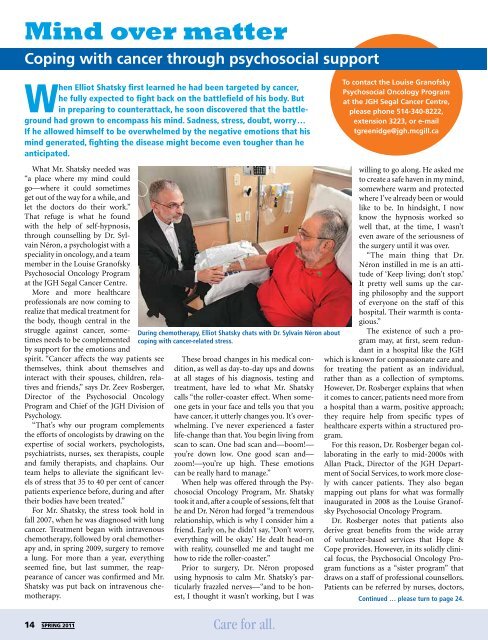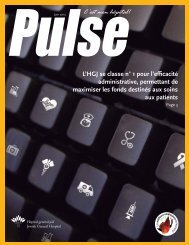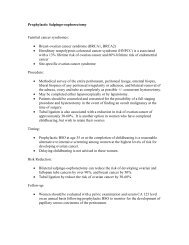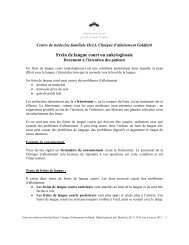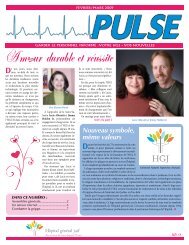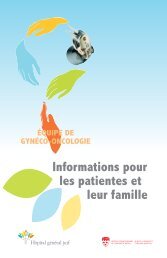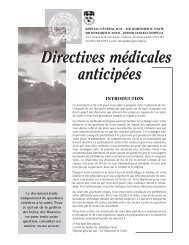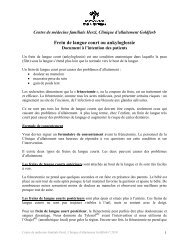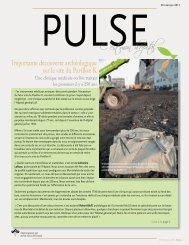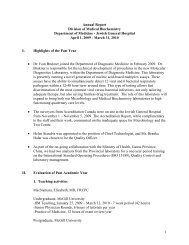No appointment? No problem!
No appointment? No problem!
No appointment? No problem!
You also want an ePaper? Increase the reach of your titles
YUMPU automatically turns print PDFs into web optimized ePapers that Google loves.
Mind over matter<br />
Coping with cancer through psychosocial support<br />
When Elliot Shatsky first learned he had been targeted by cancer,<br />
he fully expected to fight back on the battlefield of his body. But<br />
in preparing to counterattack, he soon discovered that the battleground<br />
had grown to encompass his mind. Sadness, stress, doubt, worry…<br />
If he allowed himself to be overwhelmed by the negative emotions that his<br />
mind generated, fighting the disease might become even tougher than he<br />
anticipated.<br />
What Mr. Shatsky needed was<br />
“a place where my mind could<br />
go—where it could sometimes<br />
get out of the way for a while, and<br />
let the doctors do their work.”<br />
That refuge is what he found<br />
with the help of self-hypnosis,<br />
through counselling by Dr. Sylvain<br />
Néron, a psychologist with a<br />
speciality in oncology, and a team<br />
member in the Louise Granofsky<br />
Psychosocial Oncology Program<br />
at the JGH Segal Cancer Centre.<br />
More and more healthcare<br />
professionals are now coming to<br />
realize that medical treatment for<br />
the body, though central in the<br />
struggle against cancer, sometimes<br />
needs to be complemented<br />
by support for the emotions and<br />
spirit. “Cancer affects the way patients see<br />
themselves, think about themselves and<br />
interact with their spouses, children, relatives<br />
and friends,” says Dr. Zeev Rosberger,<br />
Director of the Psychosocial Oncology<br />
Program and Chief of the JGH Division of<br />
Psychology.<br />
“That’s why our program complements<br />
the efforts of oncologists by drawing on the<br />
expertise of social workers, psychologists,<br />
psychiatrists, nurses, sex therapists, couple<br />
and family therapists, and chaplains. Our<br />
team helps to alleviate the significant levels<br />
of stress that 35 to 40 per cent of cancer<br />
patients experience before, during and after<br />
their bodies have been treated.”<br />
For Mr. Shatsky, the stress took hold in<br />
fall 2007, when he was diagnosed with lung<br />
cancer. Treatment began with intravenous<br />
chemotherapy, followed by oral chemotherapy<br />
and, in spring 2009, surgery to remove<br />
a lung. For more than a year, everything<br />
seemed fine, but last summer, the reappearance<br />
of cancer was confirmed and Mr.<br />
Shatsky was put back on intravenous chemotherapy.<br />
14 spriNG 2011<br />
During chemotherapy, Elliot Shatsky chats with Dr. Sylvain Néron about<br />
coping with cancer-related stress.<br />
These broad changes in his medical condition,<br />
as well as day-to-day ups and downs<br />
at all stages of his diagnosis, testing and<br />
treatment, have led to what Mr. Shatsky<br />
calls “the roller-coaster effect. When someone<br />
gets in your face and tells you that you<br />
have cancer, it utterly changes you. It’s overwhelming.<br />
I’ve never experienced a faster<br />
life-change than that. You begin living from<br />
scan to scan. One bad scan and—boom!—<br />
you’re down low. One good scan and—<br />
zoom!—you’re up high. These emotions<br />
can be really hard to manage.”<br />
When help was offered through the Psychosocial<br />
Oncology Program, Mr. Shatsky<br />
took it and, after a couple of sessions, felt that<br />
he and Dr. Néron had forged “a tremendous<br />
relationship, which is why I consider him a<br />
friend. Early on, he didn’t say, ‘Don’t worry,<br />
everything will be okay.’ He dealt head-on<br />
with reality, counselled me and taught me<br />
how to ride the roller-coaster.”<br />
Prior to surgery, Dr. Néron proposed<br />
using hypnosis to calm Mr. Shatsky’s particularly<br />
frazzled nerves—“and to be honest,<br />
I thought it wasn’t working, but I was<br />
Care for all.<br />
To contact the Louise Granofsky<br />
Psychosocial Oncology Program<br />
at the JGH Segal Cancer Centre,<br />
please phone 514-340-8222,<br />
extension 3223, or e-mail<br />
tgreenidge@jgh.mcgill.ca<br />
willing to go along. He asked me<br />
to create a safe haven in my mind,<br />
somewhere warm and protected<br />
where I’ve already been or would<br />
like to be. In hindsight, I now<br />
know the hypnosis worked so<br />
well that, at the time, I wasn’t<br />
even aware of the seriousness of<br />
the surgery until it was over.<br />
“The main thing that Dr.<br />
Néron instilled in me is an attitude<br />
of ‘Keep living; don’t stop.’<br />
It pretty well sums up the caring<br />
philosophy and the support<br />
of everyone on the staff of this<br />
hospital. Their warmth is contagious.”<br />
The existence of such a program<br />
may, at first, seem redundant<br />
in a hospital like the JGH<br />
which is known for compassionate care and<br />
for treating the patient as an individual,<br />
rather than as a collection of symptoms.<br />
However, Dr. Rosberger explains that when<br />
it comes to cancer, patients need more from<br />
a hospital than a warm, positive approach;<br />
they require help from specific types of<br />
healthcare experts within a structured program.<br />
For this reason, Dr. Rosberger began collaborating<br />
in the early to mid-2000s with<br />
Allan Ptack, Director of the JGH Department<br />
of Social Services, to work more closely<br />
with cancer patients. They also began<br />
mapping out plans for what was formally<br />
inaugurated in 2008 as the Louise Granofsky<br />
Psychosocial Oncology Program.<br />
Dr. Rosberger notes that patients also<br />
derive great benefits from the wide array<br />
of volunteer-based services that Hope &<br />
Cope provides. However, in its solidly clinical<br />
focus, the Psychosocial Oncology Program<br />
functions as a “sister program” that<br />
draws on a staff of professional counsellors.<br />
Patients can be referred by nurses, doctors,<br />
Continued … please turn to page 24.


